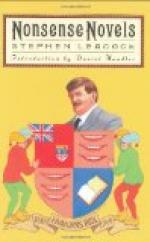But the scene of this narrative is laid in the South of England and takes place in and around Knotacentinum Towers (pronounced as if written Nosham Taws), the seat of Lord Knotacent (pronounced as if written Nosh).
But it is not necessary to pronounce either of these names in reading them.
Nosham Taws was a typical English home. The main part of the house was an Elizabethan structure of warm red brick, while the elder portion, of which the Earl was inordinately proud, still showed the outlines of a Norman Keep, to which had been added a Lancastrian Jail and a Plantagenet Orphan Asylum. From the house in all directions stretched magnificent woodland and park with oaks and elms of immemorial antiquity, while nearer the house stood raspberry bushes and geranium plants which had been set out by the Crusaders.
About the grand old mansion the air was loud with the chirping of thrushes, the cawing of partridges and the clear sweet note of the rook, while deer, antelope and other quadrupeds strutted about the lawn so tame as to eat off the sun-dial. In fact, the place was a regular menagerie.
From the house downwards through the park stretched a beautiful broad avenue laid out by Henry VII.
Lord Nosh stood upon the hearthrug of the library. Trained diplomat and statesman as he was, his stern aristocratic face was upside down with fury.
“Boy,” he said, “you shall marry this girl or I disinherit you. You are no son of mine.”
Young Lord Ronald, erect before him, flung back a glance as defiant as his own.
“I defy you,” he said. “Henceforth you are no father of mine. I will get another. I will marry none but a woman I can love. This girl that we have never seen——”
“Fool,” said the Earl, “would you throw aside our estate and name of a thousand years? The girl, I am told, is beautiful; her aunt is willing; they are French; pah! they understand such things in France.”
“But your reason——”
“I give no reason,” said the Earl. “Listen, Ronald, I give one month. For that time you remain here. If at the end of it you refuse me, I cut you off with a shilling.”
Lord Ronald said nothing; he flung himself from the room, flung himself upon his horse and rode madly off in all directions.
As the door of the library closed upon Ronald the Earl sank into a chair. His face changed. It was no longer that of the haughty nobleman, but of the hunted criminal. “He must marry the girl,” he muttered. “Soon she will know all. Tutchemoff has escaped from Siberia. He knows and will tell. The whole of the mines pass to her, this property with it, and I—but enough.” He rose, walked to the sideboard, drained a dipper full of gin and bitters, and became again a high-bred English gentleman.
It was at this moment that a high dogcart, driven by a groom in the livery of Earl Nosh, might have been seen entering the avenue of Nosham Taws. Beside him sat a young girl, scarce more than a child, in fact not nearly so big as the groom.




